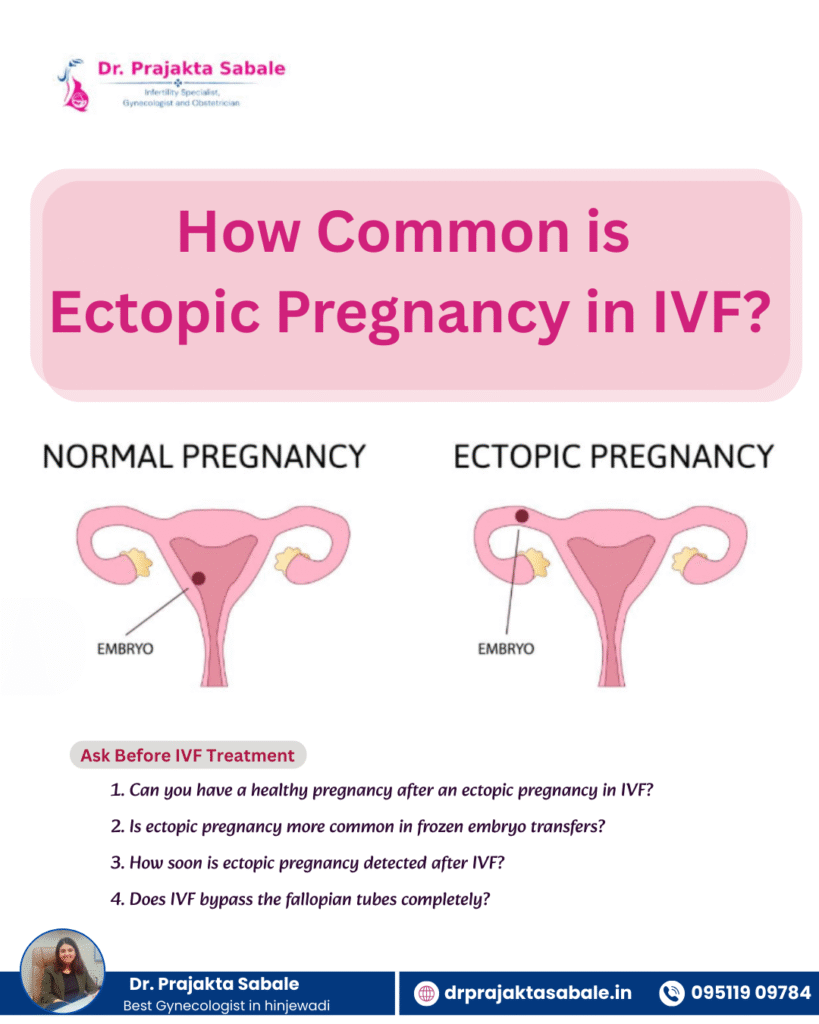These days, infertility has become a common concern, and IVF treatment is one of the most preferred solutions. When couples choose IVF to achieve their dream of becoming parents, they naturally hope for a smooth and successful journey. However, one rare but important complication to be aware of is ectopic pregnancy. While uncommon, understanding its risks, causes, and preventive measures is crucial for anyone considering or undergoing IVF treatment in Hinjewadi.
What is an Ectopic Pregnancy?
An ectopic pregnancy occurs when a fertilized embryo implants outside the uterus, most commonly in the fallopian tubes. This is a medical emergency, as it can cause serious complications if left untreated. In IVF, the embryo is placed directly into the uterus, but in rare cases, it may migrate and implant elsewhere.
How Common is Ectopic Pregnancy in IVF?
In natural conception, ectopic pregnancies occur in about 1-2% of all pregnancies. In IVF, the rate is slightly higher, ranging between 2-5%, depending on the woman’s age, medical history, and fertility conditions.
Risk factors that increase the likelihood of ectopic pregnancy in IVF include:
-
Damaged or blocked fallopian tubes
-
Previous pelvic infections
-
Multiple embryo transfers
-
Uterine abnormalities
Why Does It Happen in IVF?
Even though the embryo is placed in the uterus during IVF, it can sometimes travel into the fallopian tube and implant there. Factors like tubal scarring, past surgeries, or abnormal uterine contractions can contribute to this.
Symptoms to Watch For
Early detection is key. Seek immediate medical help if you experience:
-
Sharp abdominal or pelvic pain
-
Vaginal bleeding
-
Shoulder pain
-
Dizziness or fainting
Prevention & Management
While ectopic pregnancy cannot always be prevented, careful screening and advanced IVF techniques can reduce the risk. Doctors often perform early pregnancy scans after IVF to confirm the embryo’s location and take quick action if needed.
Treatment options may include:
-
Medication (methotrexate) to stop pregnancy growth
-
Minimally invasive surgery to remove the ectopic tissue
FAQ on Ectopic Pregnancy in IVF
1. Can you have a healthy pregnancy after an ectopic pregnancy in IVF?
Yes, with proper treatment and recovery, many women go on to have successful pregnancies after an ectopic pregnancy.
2. Is ectopic pregnancy more common in frozen embryo transfers?
The risk can be slightly higher if the patient has pre-existing tubal issues, but frozen embryo transfers themselves are generally safe.
3. How soon is ectopic pregnancy detected after IVF?
An early ultrasound around 5-6 weeks after embryo transfer can help detect ectopic pregnancy quickly.
4. Does IVF bypass the fallopian tubes completely?
Yes, but if the tubes are damaged, embryos may still migrate there, increasing the ectopic risk.
Conclusion
Ectopic pregnancy after IVF is rare but possible. Choosing an experienced fertility specialist and undergoing proper pre-IVF evaluation can significantly lower the risk. With timely diagnosis and expert care, most women can recover fully and continue their fertility journey.
Request a Call Back
If you’re planning IVF treatment in Hinjewadi and want expert guidance to minimize risks like ectopic pregnancy, consult Dr. Prajakta Sabale, a trusted gynecologist and fertility specialist in Hinjewadi
📞 Call us now or request a call back to discuss your IVF journey with complete care and safety.

